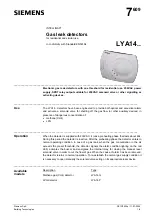
alert coupled with simultaneous identification of the
Radar band (X, K or Ka) and signal strength in the
Text Display. The number of bar graph segments
displayed depends upon the strength of the signal
received. As the strength of the Radar signal
increases, the audio alert becomes more rapid and
the bar graph will display the maximum number of
five segments indicating maximum signal strength.
Assuming the Radar signal remains uninterrupted,
the audible and visual alerts will clearly indicate a
“weak” signal becoming stronger as you drive closer
to the Radar source. Remember, when the police
Radar source is moving toward you, the Radar signal
strength will increase much more rapidly than if you
are approaching a stationary source.
2.
Stationary Radar aimed around a corner
Under this circumstance, reaction time is considerably
reduced. Since the Radar signals are transmitted
across your line of travel, there is generally no signal
available to receive until you are relatively close to the
source. Once an alert is received, expect the strength
of the signal to increase very quickly. Advanced
warning in this situation may be reduced.
3.
Stationary Radar concealed
by the crest of a hill aimed in your direction
21










































